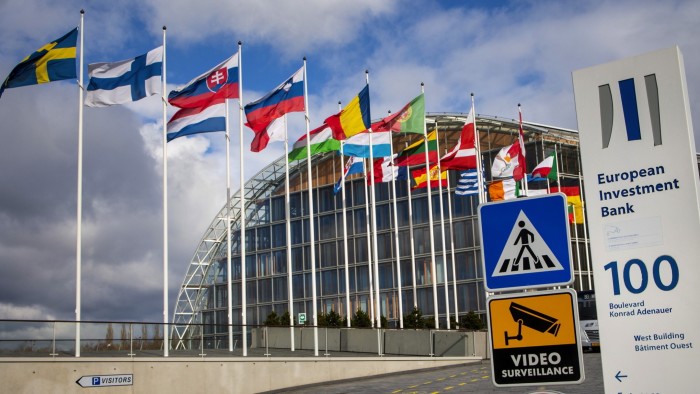The European Investment Bank fears a “reputational disaster” this year if the EU applies reporting rules that would shatter its climate-friendly credentials, according to leaked internal correspondence.
The world’s biggest multilateral lender by assets has branded itself as “the climate bank” and from 2021 phased out all fossil fuel investments from its loan book of more than €500bn.
But in a confidential email to colleagues seen by the Financial Times, the EIB’s head of operations Jean-Christophe Laloux warned of a “major reputational risk” to the bank from new EU sustainable reporting rules, which this year require a taxonomy classifying green investments.
The reporting reforms would force the bank to declare a “Green Asset Ratio” — an EU standard intended to show the proportion of a bank’s assets considered climate-friendly — of “around 1 per cent”, compared with its current “Climate Action ratio” based on EIB-defined metrics that stands “above 50 per cent”.
Work on compliance with the EU reporting rules was deemed “not acceptable”, the email continued, “because it will bring us to a reputational disaster”.
See more : BNP Paribas Expands Portfolio With Axa Investment Managers Purchase
“We should postpone the compliance timeline . . . work on telling the [European Commission] exactly what needs to be changed in the regulation for the taxonomy to be workable for a use of proceeds bank like EIB, which it is not at present, and understand clearly the impact on clients,” it said.
Laloux’s comments echo growing concerns from EU governments and industry bodies about the complexity and burden of the EU’s sustainable finance rule book, which forms a major plank of the bloc’s ambitious Green Deal climate law.
In a letter to the commission president Ursula von der Leyen, also seen by the FT, the presidents of six development banks including Nadia Calviño of the EIB said that the banks were “particularly concerned that additional data collection requirements we would need to impose [on] our clients, especially SMEs, will lead to an excessive reporting burden”.
It said that “the way in which the Green Asset Ratio is currently calculated penalises a whole range of otherwise green investments, and will inadvertently, and paradoxically, discourage the financing of climate action by policy-driven lenders such as our institutions”.
The commission has said that investments outside the EU are not included in the GAR because those businesses are not obliged to comply with the bloc’s corporate sustainability rules. SMEs are also excluded.
The EIB, however, has been accused by campaign groups and current and former employees of a lack of transparency in the way it operates and being overly concerned about its reputation at the expense of proper due diligence.
Anna Roggenbuck, policy officer at the campaign group CEE Bankwatch, said the EIB “is not transparent in how it calculates a project’s carbon emissions including all the scope of emissions, and because this is not public, there is no outside scrutiny”.
See more : Japanese billionaire Masayoshi Son pledges major US investment
Julia Symon, head of research and advocacy at the non-governmental organisation Finance Watch, said it was “hard to make sense” of the EIB’s internal climate action ratio “because it is hard to know what criteria [they] have in place. Are they actually doing a good job?”
But, she added, there was a wider issue that the commission had to address of “how to reflect [energy] transition financing in a credible way” without overburdening banks and investors.
One of the former EIB employees, who asked not to be named, said that “some loans are labelled ‘environmental’ sometimes with little effective environmental output”.
Last year, the European Court of Justice ruled in favour of the NGO ClientEarth, which argued that the EIB had illegally avoided scrutiny of its decision to lend €60mn for the construction of a Spanish biomass plant and that the loan had contravened the bank’s own responsible investment criteria.
The bank said it had “fully implemented” the ECJ ruling to review the decision. It said it currently assesses loans on the basis of criteria laid out in a 30-page document updated in June based on the “principles” of the EU’s taxonomy and “harmonised with the multilateral development banks’ joint methodologies for climate finance tracking”.
In 2023 it committed €44.3bn to climate-friendly projects, it said, which accounted for 60 per cent of lending from its own balance sheet that year.
A spokesperson said it had a “clear framework for assessing green investments” and was “engaging with the European Commission to help recalibrate green reporting rules and regulations, reduce red tape for companies and ensure that these capture and incentivise all green investments”.
Climate Capital

Where climate change meets business, markets and politics. Explore the FT’s coverage here.
Are you curious about the FT’s environmental sustainability commitments? Find out more about our science-based targets here

